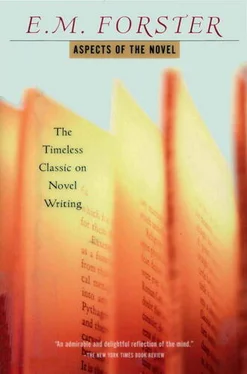This is perhaps a roundabout way of saying what every British schoolboy knew, that the historian records whereas the novelist must create. Still, it is a profitable roundabout, for it brings out the fundamental difference between people in daily life and people in books. In daily life we never understand each other, neither complete clairvoyance nor complete confessional exists. We know each other approximately, by external signs, and these serve well enough as a basis for society and even for intimacy. But people in a novel can be understood completely by the reader, if the novelist wishes; their inner as well as their outer life can be exposed. And this is why they often seem more definite than characters in history, or even our own friends; we have been told all about them that can be told; even if they are imperfect or unreal they do not contain any secrets, whereas our friends do and must, mutual secrecy being one of the conditions of life upon this globe.
Now let us restate the problem in a more school-boyish way. You and I are people. Had not we better glance through the main facts in our own lives— not in our individual careers but in our make-up as human beings? Then we shall have something definite to start from.
The main facts in human life are five: birth, food, sleep, love and death. One could increase the number—add breathing for instance—but these five are the most obvious. Let us briefly ask ourselves what part they play in our lives, and what in novels. Does the novelist tend to reproduce them accurately or does he tend to exaggerate, minimize, ignore, and to exhibit his characters going through processes which are not the same through which you and I go, though they bear the same names?
To consider the two strangest first: birth and death; strange because they are at the same time experiences and not experiences. We only know of them by report. We were all born, but we cannot remember what it was like. And death is coming even as birth has come, but, similarly, we do not know what it is like. Our final experience, like our first, is conjectural. We move between two darknesses. Certain people pretend to tell us what birth and death are like: a mother, for instance, has her point of view about birth; a doctor, a religious, have their points of view about both. But it is all from the outside, and the two entities who might enlighten us, the baby and the corpse, cannot do so, because their apparatus for communicating their experiences is not attuned to our apparatus for reception.
So let us think of people as starting life with an experience they forget and ending it with one which they anticipate but cannot understand. These are the creatures whom the novelist proposes to introduce as characters into books; these, or creatures plausibly like them. The novelist is allowed to remember and understand everything, if it suits him. He knows all the hidden life. How soon will he pick up his characters after birth, how close to the grave will he follow them? And what will he say, or cause to be felt, about these two queer experiences?
Then food, the stoking-up process, the keeping alive of an individual flame, the process that begins before birth and is continued after it by the mother, and finally taken over by the individual himself, who goes on day after day putting an assortment of objects into a hole in his face without becoming surprised or bored: food is a link between the known and the forgotten; closely connected with birth, which none of us remembers, and coming down to this morning's breakfast. Like sleep—which in many ways it resembles—food does not merely restore our strength, it has also an aesthetic side, it can taste good or bad. What will happen to this double-faced commodity in books?
And fourthly, sleep. On the average, about a third of our time is not spent in society or civilization or even in what is usually called solitude. We enter a world of which little is known and which seems to us after leaving it to have been partly oblivion, partly a caricature of this world and partly a revelation. "I dreamt of nothing" or "I dreamt of a ladder" or "I dreamt of heaven" we say when we wake. I do not want to discuss the nature of sleep and dreams—only to point out that they occupy much time and that what is called "History" only busies itself with about two-thirds of the human cycle, and theorizes accordingly. Does fiction take up a similar attitude?
And lastly, love. I am using this celebrated word in its widest and dullest sense. Let me be very dry and brief about sex in the first place. Some years after a human being is born, certain changes occur in it, as in other animals, which changes often lead to union with another human being, and to the production of more human beings. And our race goes on. Sex begins before adolescence, and survives sterility; it is indeed coeval with our lives, although at the mating age its effects are more obvious to society. And besides sex, there are other emotions, also strengthening towards maturity: the various upliftings of the spirit, such as affection, friendship, patriotism, mysticism—and as soon as we try to determine the relation between sex and these other emotions we shall of course begin to quarrel as violently as we ever could about Walter Scott, perhaps even more violently. Let me only tabulate the various points of view. Some people say that sex is basic and underlies all these other loves—love of friends, of God, of country. Others say that it is connected with them, but laterally; it is not their root. Others say that it is not connected at all. All I suggest is that we call the whole bundle of emotions love, and regard them as the fifth great experience through which human beings have to pass. When human beings love they try to get something. They also try to give something, and this double aim makes love more complicated than food or sleep. It is selfish and altruistic at the same time, and no amount of specialization in one direction quite atrophies the other. How much time does love take? This question sounds gross but it must be asked because it bears on our present inquiry. Sleep takes about eight hours out of the twenty-four, food about two more. Shall we put down love for another two? Surely that is a handsome allowance. Love may weave itself into our other activities—so may drowsiness and hunger. Love may start various secondary activities: for instance, a man's love for his family may cause him to spend a good deal of time on the Stock Exchange, or his love for God a good deal of time in church. But that he has emotional communion with any beloved object for more than two hours a day may be gravely doubted, and it is this emotional communion, this desire to give and to get, this mixture of generosity and expectation, that distinguishes love from the other experiences on our list.
That is the human make-up—or part of it. Made up like this himself, the novelist takes his pen in his hand, gets into the abnormal state which it is convenient to call "inspiration," and tries to create characters. Perhaps the characters have to fall in with something else in his novel: this often happens (the books of Henry James are an extreme case), and then the characters have, of course, to modify the make-up accordingly. However, we are considering now the more simple case of the novelist whose main passion is human beings and who will sacrifice a great deal to their convenience—story, plot, form, incidental beauty.
Well, in what senses do the nations of fiction differ from those of the earth? One cannot generalize about them, because they have nothing in common in the scientific sense; they need not have glands, for example, whereas all human beings have glands. Nevertheless, though incapable of strict definition, they tend to behave along the same lines.
In the first place, they come into the world more like parcels than human beings. When a baby arrives in a novel it usually has the air of having been posted. It is delivered "off"; one of the elder characters goes and picks it up and shows it to the reader, after which it is usually laid in cold storage until it can talk or otherwise assist in the action. There is both a good and bad reason for this and for all other deviations from earthly practice; these we will note in a minute, but do just observe in what a very perfunctory way the population of noveldom is recruited. Between Sterne and James Joyce, scarcely any writer has tried either to use the facts of birth or to invent a new set of facts, and no one, except in a sort of auntish wistful way, has tried to work back towards the psychology of the baby's mind and to utilize the literary wealth that must lie there. Perhaps it cannot be done. We shall decide in a moment.
Читать дальше












